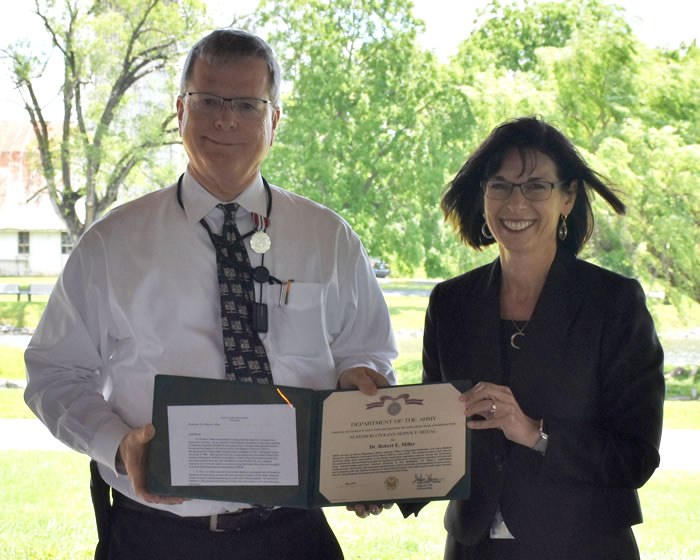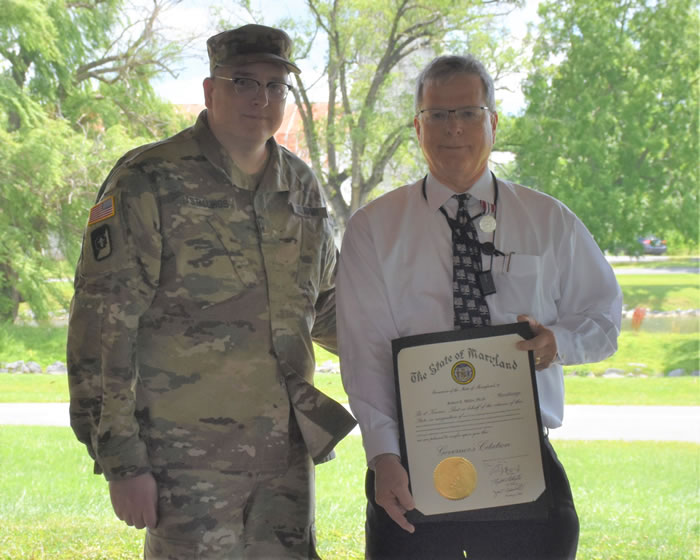Saying Goodbye to Dr. Robert Miller

Wrapping up a career that spans nearly four decades, Dr. Robert E. Miller will be retiring from the federal civilian workforce on June 30. Currently serving as a Senior Regulatory Affairs Advisor for the U.S. Army Medical Research and Development Command's Office of Regulated Activities, Miller spent a majority of the past 24 years supporting the U.S. Army Medical Materiel Development Activity in various technical roles that include Product Manager, Project Manager and Director of USAMMDA's former Division of Regulated Activities and Compliance.
I first met Miller in 2002, as we were co-workers employed by a local biotech company supporting the Department of Defense. I clearly remember his warmth and authenticity, and the deliberate way he chose his words. He asked me about my last name, as he recognized that it was of Brazilian origin, and told me that he had spent three years in Rio de Janeiro with his family, in support of the U.S. Army Medical Research Unit in Brazil. I was immediately struck by Miller's sincerity, and when I happened to see him again years later at Fort Detrick, I was pleased to discover neither the man nor his character had changed.
During our recent meeting, we talked much about Miller's professional career, which includes his retirement from the U.S. Army as a Lieutenant Colonel. Holding bachelor's and master's degrees in Microbiology, and a doctorate in Biology, one should not be surprised to learn that his resume includes numerous science-related directorships at both Walter Reed Army Institute of Research and USAMMDA, as well as a professorship with the Uniformed Services University of the Health Sciences.
Yes, many who are familiar with Miller realize he is an accomplished professional; however, I wanted to discover more about this man with a smile as big as Texas. And speaking of the Lone Star State, it happens to be where Miller was born and raised, as the youngest of three brothers. He began detailing his life for me, and started with a childhood that he considers "wonderful" albeit "very uneventful."
"I grew up in Texas, and my father was a senior manager for Sears, so we moved five times before I was 12," he said. "At that point, however, my father left Sears and opened a high-end boys and students clothing store called the Stag Shop in Tyler, Texas. I worked in the store as a stock boy, and then as a salesman from junior high school all through college. During this time, my main activities included working at my father's small beef cattle farm, and in the summer, I would go swimming and sailing at Lake Tyler with family and friends."
Miller explained how he had always wanted to be a marine biologist, as he had been a life guard, Red Cross swimming instructor, and a certified scuba instructor during high school. However, a college professor changed Miller's mind – and his career path – during his sophomore year at Texas A&M University.
"I'll never forget the course I took from Dr. Wilbert Taber, who was a retired industrial microbiologist," he recalled. "We had several discussions about my career choice, and he let me know that only Jacques Cousteau and his family made any money in marine biology. He said that there were many wonderful opportunities in microbiology, so I switched my major to microbiology, and I never looked back."
Education was always very important in Miller's family, and he credits his parents as the ones who influenced him most and helped nurture his love of science. Despite a diagnosis of dyslexia in grade school – or perhaps because of this – Miller was extremely focused on his studies and always excelled academically. This accomplishment grows even more impressive after he explains how he met his wife during their high school years in Texas.
"My wife Cindy and I were actually high school sweethearts," said Miller. "We were set up by a girl who worked at my family's store, when I was a junior and my wife was a sophomore. Cindy had learned my schedule, and she arranged a time to 'bump into me' at school. We dated all through high school, and then I went to A&M and she went to Southern Methodist University, so we had a long-distance relationship for a time. "We were engaged during my junior year in college," he continued, "and she transferred to A&M. Then we married in 1976, after both of us had graduated."
The ensuing years brought two sons to the couple, and two more graduate degrees for Miller – which goes back to the above comment regarding the impressiveness of Miller's focus on academic excellence, in light of both marriage and children at an early age.
Upon completion of his doctorate from Tulane University in 1982, Miller joined the Army as part of the Medical Service Corps. He was assigned initially to WRAIR as a branch chief in the Division of Experimental Therapeutics, and returned for another assignment there as director of the Antimalarial in Vitro Drug Discovery Laboratory, beginning in 1992. Interestingly, Miller was involved early in the development of the antimalarial drug, Tafenoquine, which has been managed by USAMMDA since 1988. He led the in vitro testing of the drug while at WRAIR, and was "reunited" with the program when he came to USAMMDA's Pharmaceutical Systems Division in 1995. Last fall, after nearly four decades of research and development, Tafenoquine was approved for use by the U.S. Food and Drug Administration, and became the first FDA-approved prophylactic drug for malaria in more than 18 years.
Over the years, Miller has played a role in many of USAMMDA's accomplishments, which includes pulling off the nearly impossible task of writing and filing an FDA Investigational New Drug application for French Freeze-dried Plasma in less than 30 days.
In fact, it was 23 days.

During a 2016 interview, Miller explained how he and his DRAC team, comprised of only six people, completed all of the required documentation for FDA submission in just over three weeks – from start to finish.
Recalling this conversation, Miller had said, "After our first meeting with the U.S. Army Special Operations Command, we were given only 30 days to write and file the IND [for French FDP], as well as to include the treatment protocol for it. But keep in mind, in a real-world scenario, it typically takes three to six months to do all of this through human subjects research review and the FDA – and we only had 30 days."
As for his answer regarding why this needed to happen so quickly, the response was concise. "If our Soldiers needed it, there was no other option," said Miller.
In a nutshell, this simple reply may sum up both Miller's character and his dedication to our nation. Now, after more than 37 years of service – both in and out of uniform – he is looking forward to life in retirement, so he can spend more time with his wife, children and five grandchildren.
I was curious to know if retirement would include moving back to Texas, but Miller said that he and his wife are building a new home, south of Richmond, Virginia, so they can be closer to family.
"Our son and daughter-in-law live in Virginia with their three children, and we thought it would be a great place to settle down," he explained. "It's a lakeside community, and the home should be ready in early 2020, so we look forward to enjoying it with the family."
While fishing may come to mind when thinking of a lake house, Miller said that's not necessarily a top priority for him, as a hobby.
"Actually, I love digital photography," he said. "My poor sons probably think I was born with a camera strapped to my eye! But I also like fresh water sailing and swimming, and my wife and I will do a lot of traveling. We already have plans for heading to Ireland and Scotland, as well as South Africa."
It seems the road ahead will be quite pleasant for Miller, as there will be so much to enjoy. In light of this, who would he like to thank for helping him reach this point in his life?
"Who should I not thank?" he asked. "So many people have been so supportive of me over the years, especially my parents, and my wonderful high school sweetheart who became my wife. My two sons, who always kept me on my toes – even now – and their families. At work, it would be Dr. Ron Clawson, my primary mentor who let me pursue a path in regulatory affairs as well as acquisition – I really have to thank them all."
Without question, there are quite a few people who must thank Miller as well – for his military service, his dedication to scientific research and his country, for his professionalism, his kindness, authenticity and compassion, for his service to USAMMDA. The list goes on and on.
Army Col. Ryan Bailey, USAMMDA commander, is among the many to offer congratulations and well wishes to Miller on his new life ahead.
"Dr. Miller served his country honorably for an amazing 37 years," said Bailey. "Through his regulatory expertise, he contributed immensely to the mission of developing and delivering medical solutions for our Warfighters. It was an honor to serve with him."
While he sadly says he will miss his USAMMDA regulatory family, Miller should feel very confident that he may be missed even more. Although certainly deserved, Miller's retirement will leave the organization with a void to fill. The knowledge he takes with him cannot easily be obtained, as those with nearly 40 years of specialized information regarding science and technology, FDA rules and regulations, Army and DOD acquisition, pharmaceuticals, etc. are few and far between.
Nevertheless, it's time for the good doctor to travel the world, build a new home, spend time with his grandchildren, fill up photo albums, sail on the lake and relive some of his high school memories with his lovely sweetheart on his arm – while the rest of us wait to do the same someday.
Enjoy your retirement, Sir, and rest assured of your hand in the success of the organization.
Finally, after nearly 40 years, it's Miller time.
As a subordinate command of the U.S. Army Medical Research and Development Command, USAMMDA maintains a mission to develop and deliver quality medical capabilities to protect, treat and sustain the health of our nation's Service Members throughout the world.













